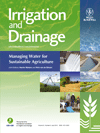
IRRIGATION AND DRAINAGE
Scope & Guideline
Fostering dialogue and innovation in water resource management.
Introduction
Aims and Scopes
- Water Management Techniques:
Research on various irrigation methods, including traditional and modern technologies, aiming to optimize water use efficiency and crop yield. - Impact of Climate Change:
Studies that assess the effects of climate variability on irrigation practices, crop production, and water resource availability. - Soil and Water Interaction:
Investigations into soil moisture dynamics, salinity management, and the development of models to predict soil-water interactions under different irrigation regimes. - Sustainable Agricultural Practices:
Examination of practices that promote sustainable water use in agriculture, including organic farming, integrated pest management, and conservation techniques. - Policy and Governance:
Analysis of irrigation governance, policy frameworks, and socio-economic factors influencing water management decisions at local and national levels. - Technological Innovations:
Exploration of advanced technologies such as IoT, machine learning, and remote sensing to enhance irrigation management and water resource monitoring.
Trending and Emerging
- Water-Energy-Food Nexus:
An increasing focus on the interconnectedness of water, energy, and food systems, emphasizing integrated management approaches to enhance sustainability. - Smart Irrigation Technologies:
A surge in research on smart irrigation systems, including IoT-based solutions and automation, aimed at improving water efficiency and reducing labor costs. - Climate Resilience Strategies:
Growing emphasis on developing irrigation strategies that enhance resilience to climate change impacts, ensuring food security under variable environmental conditions. - Participatory Management Approaches:
Emerging interest in participatory irrigation management, which involves local communities in decision-making processes to improve irrigation system performance. - Use of Machine Learning and AI:
An increase in studies applying machine learning and artificial intelligence to optimize irrigation practices, predict water needs, and assess system performance. - Sustainable Practices and Resource Recovery:
A trend toward exploring sustainable agricultural practices, including water reuse and recycling, to mitigate water scarcity and enhance agricultural productivity.
Declining or Waning
- Traditional Irrigation Techniques:
Research on conventional irrigation methods has decreased, suggesting a transition towards more innovative and efficient practices that leverage modern technology. - Water Quality Studies:
Although important, studies focusing solely on water quality without integration into broader irrigation management practices have become less prevalent. - Single Crop Focus:
Research focusing exclusively on single crops under irrigation is waning, with a growing interest in multi-crop systems and intercropping strategies for improved resource efficiency. - Historical Analysis of Irrigation Systems:
Investigations into historical irrigation practices and their socio-economic impacts have seen reduced emphasis, possibly due to a shift towards future-oriented solutions and technologies. - Localized Case Studies:
While localized studies remain relevant, there is a declining trend in publications that do not incorporate broader implications or comparisons across different regions.
Similar Journals

Terra Latinoamericana
Advancing Knowledge for Sustainable EcosystemsTerra Latinoamericana is a prominent academic journal published by the Mexican Society of Soil Science, focusing on the essential disciplines of soil science, biochemistry, and ecology. With a dedicated commitment to open access since 2014, this journal provides a platform for researchers and professionals to disseminate and access cutting-edge research aimed at understanding soil interactions, environmental pollution, and ecosystems within Latin America. The journal holds a Q4 ranking in multiple categories, including Ecology and Soil Science, reflecting its growing presence in the academic landscape and its role in fostering scholarly communication within these fields. Though currently positioned in the lower quartiles, Terra Latinoamericana presents a valuable opportunity for emerging scholars and experienced researchers alike to contribute impactful findings and engage with key issues affecting soil health and ecological sustainability in diverse environments. By promoting innovative research and collaborative dialogue, this journal continues to shape the future of soil science and related disciplines, making it an indispensable resource for the scientific community.

Journal of the ASABE
Connecting Experts to Innovate in Agriculture and BeyondJournal of the ASABE, published by the American Society of Agricultural and Biological Engineers, serves as a pivotal platform for disseminating cutting-edge research in various disciplines, including Agronomy, Crop Science, Biomedical Engineering, Food Science, Forestry, and Soil Science. With an impact factor that reflects its significance and reach, the journal ranks in the Q2 and Q3 quartiles across numerous categories in 2023, showcasing its commitment to advancing knowledge in agricultural and biological engineering. Authored by leading experts, the journal offers accessible articles on innovative methodologies, technologies, and sustainable practices essential to the global agricultural and environmental landscape. Open access options ensure that research findings are readily available to a broad audience, promoting collaboration and knowledge sharing among researchers, professionals, and students alike. With a strategic focus on research convergence into 2024, Journal of the ASABE is poised to shape the future of engineering solutions in agriculture and beyond.
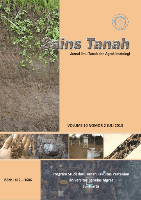
SAINS TANAH
Championing Research for a Greener TomorrowSAINS TANAH is a renowned peer-reviewed journal that focuses on the fields of agronomy, soil science, and environmental studies, published by Universitas Sebelas Maret Surakarta in Indonesia. Established as an Open Access platform since 2001, it aims to disseminate high-quality research that addresses critical issues in soil health, crop management, and pollution, thereby fostering sustainable agricultural practices. With its current impact factor demonstrating a Category Quartile ranking of Q3 and Q4 in major areas such as Agronomy and Crop Science, Atmospheric Science, and Pollution, SAINS TANAH serves as an essential resource for researchers, professionals, and students dedicated to advancing knowledge and solutions in these vital fields. By providing a collaborative environment and upholding rigorous academic standards, the journal not only highlights the significance of Indonesian research contributions but also aims to connect local insights with global agricultural and environmental challenges.
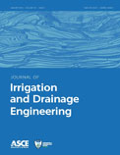
JOURNAL OF IRRIGATION AND DRAINAGE ENGINEERING
Innovating the Future of Irrigation and DrainageJOURNAL OF IRRIGATION AND DRAINAGE ENGINEERING, published by the ASCE - American Society of Civil Engineers, stands as a pivotal resource in the fields of irrigation and drainage engineering. With a rich publication history dating back to 1966 and continuing robustly through to 2024, this journal serves as a critical platform for disseminating innovative research and developments that contribute to effective water management practices. Catering to an audience of researchers, professionals, and students, it holds a notable impact factor within its categories, ranking Q2 in Agricultural and Biological Sciences (miscellaneous) and Q3 in both Civil and Structural Engineering and Water Science and Technology for 2023. This journal not only stimulates dialogue among experts but also addresses pressing global water challenges, promoting sustainable practices in resource management. Although it does not offer open access, the depth of its content and adherence to rigorous academic standards ensure it remains an essential citation for anyone involved in water resource engineering and the applied sciences surrounding agricultural efficiency.
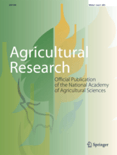
AGRICULTURAL RESEARCH
Transforming agricultural practices through scholarly excellence.AGRICULTURAL RESEARCH is a distinguished academic journal published by SPRINGER INDIA, focusing on the dynamic fields of Agronomy, Crop Science, and Food Science. With an ISSN of 2249-720X and E-ISSN of 2249-7218, this journal has established itself as a valuable resource for researchers, professionals, and students dedicated to advancing agricultural knowledge and practices. The journal is recognized in the 2023 Scopus Rankings, achieving commendable quartile positions, including Q2 in Agronomy and Crop Science and Plant Science, as well as Q3 in Food Science, indicating its influential presence in the academic community. AGRICULTURAL RESEARCH aims to disseminate cutting-edge research findings, innovative methodologies, and comprehensive reviews, fostering collaboration and discussion among scholars in Switzerland and beyond. Through its commitment to scholarly excellence, this journal is pivotal in addressing contemporary challenges in agriculture, ensuring sustainability, and enhancing food security for the future.

Soil and Water Research
Exploring Innovative Solutions for Environmental ChallengesSoil and Water Research, an esteemed journal published by the Czech Academy Agricultural Sciences, is dedicated to advancing the fields of Aquatic Science and Soil Science. With a strong commitment to open access since 2006, this journal facilitates the dissemination of high-quality research and fosters global collaboration among researchers, professionals, and students. Operating from the vibrant academic hub of Prague, Czech Republic, it serves as a key resource for those interested in pressing environmental and agricultural challenges. Featuring a robust H-index and ranking in the Q2 category for both Aquatic Science and Soil Science as of 2023, Soil and Water Research occupies a prominent position in Scopus, ensuring that published works reach a wide audience. The journal invites contributions that explore innovative methodologies and provide insights into soil and water management practices, thus playing a critical role in addressing sustainability issues within these interconnected domains. As researchers navigate the complexities of climate change and resource management, Soil and Water Research stands out as a vital tool for informed decision-making and impactful research.

CROP SCIENCE
Empowering researchers to enhance global food security.CROP SCIENCE, published by WILEY, is a premier journal dedicated to the field of agronomy and crop science, offering a platform for high-quality research on crop production, genetics, and sustainable agricultural practices. With an impactful presence since its inception in 1974, the journal has become a significant contributor to advancing knowledge in this critical field, as evidenced by its Q2 ranking in the 2023 categorizations and a Scopus rank in the 72nd percentile among its peers. The journal's aim is to disseminate innovative research findings that inform best practices and policies for enhancing crop yield and sustainability, making it an essential resource for researchers, professionals, and students alike. Although CROP SCIENCE does not currently offer open access options, the journal’s extensive readership and reputation make it a valuable asset for anyone invested in the future of agriculture.

Paddy and Water Environment
Exploring the synergy between agriculture and environmental preservation.Paddy and Water Environment is a pivotal journal published by Springer Heidelberg, dedicated to advancing the fields of Agronomy, Environmental Engineering, and Water Science and Technology. Established in 2005, this esteemed journal focuses on the complex interactions between paddy cultivation and water management, addressing critical issues related to sustainable agriculture and environmental preservation. With an impressive performance in Scopus rankings—holding Q2 positions across multiple categories and showcasing a commendable publication impact—this journal serves as an essential resource for researchers, professionals, and students alike. Paddy and Water Environment provides insightful research articles, reviews, and case studies that contribute to the understanding of the intricate relationships between the environment and agricultural practices, promoting strategies for sustainable development. Subscribers benefit from access to a wealth of knowledge, underscoring the journal's significance in fostering scientific inquiry and innovation within its domain.
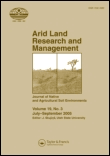
ARID LAND RESEARCH AND MANAGEMENT
Transforming arid landscapes through innovative research.ARID LAND RESEARCH AND MANAGEMENT is a leading journal in the field of Soil Science, published by Taylor & Francis Inc in the United Kingdom. With a focus on the sustainable management of arid and semi-arid lands, this journal aims to bridge the gap between scientific research and practical application. It garners a respectable impact factor, categorically positioned in the Q2 quartile within its field and ranks 59th out of 159 in Scopus, representing the top 63rd percentile of journals in Agricultural and Biological Sciences - Soil Science. As an essential resource for researchers, practitioners, and students alike, ARID LAND RESEARCH AND MANAGEMENT publishes high-quality, peer-reviewed articles that cover a wide range of topics, from soil conservation techniques to innovative land management practices. Open access options are available, facilitating broader dissemination of knowledge critical to addressing global challenges associated with arid environments. Targeting a pivotal area of study, this journal plays a significant role in advancing the understanding and management of these unique ecosystems, making it a valuable asset for anyone engaged in environmental sustainability.
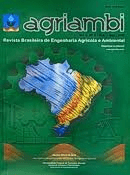
Revista Brasileira de Engenharia Agricola e Ambiental
Pioneering Research in Agricultural and Environmental SciencesRevista Brasileira de Engenharia Agricola e Ambiental, published by the Universidade Federal de Campina Grande, serves as a pivotal platform for researchers and professionals in the fields of agricultural and biological sciences, agronomy, and environmental engineering. With an open-access policy since 2000, this journal aims to foster global dissemination of innovative research and practices, ensuring that high-quality findings are accessible to all. Operating in Brazil, it holds notable rankings, including Q2 in the categories of Agricultural and Biological Sciences (miscellaneous) and Agronomy and Crop Science, indicating its strong academic impact and influence within these fields. As of 2023, it ranks #68 out of 193 in Agricultural and Biological Sciences and #188 out of 406 in Agronomy and Crop Science, representing its commitment to advancing scientific knowledge. The journal primarily focuses on publishing studies that address challenges in agricultural engineering and environmental sustainability, making it an essential read for students, researchers, and professionals who are dedicated to innovation and excellence in these dynamic fields.